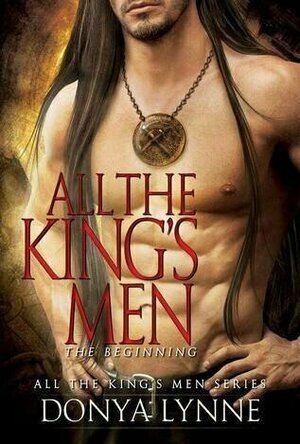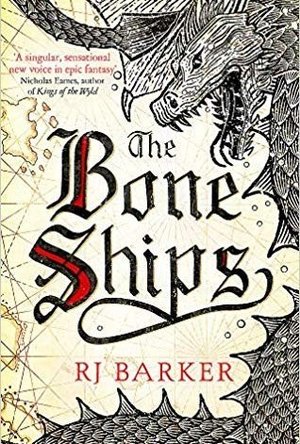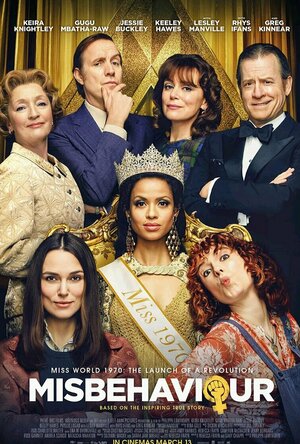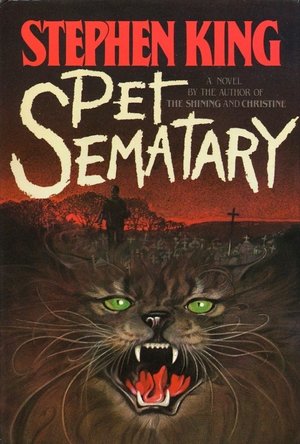Search
Ross (3284 KP) rated The Bone Ships in Books
Oct 28, 2019
This book is the start of RJ Barker's second fantasy series - a swashbuckling adventure. Where in his first series, the Wounded Kingdom, the world-building was minimal (or rather, it was just enough to be able to tell the story he wanted to tell), here the reader is thrown in at the deep end. The world the book takes place in is one where the bones of sea dragons are used to build ships, which themselves are generally used to battle against other nations' ships to steal their bones. This is because there are no more of these dragons, or so they thought ...
The first quarter of this book feels like wading through treacle, it is so thick with unexplained terms, creatures, materials and nautical job titles. Even things like trees are renamed as "gion" or "varisk", making it really hard to make head or tale of.
The story follows Joron, a depressed man lumbered with the role of shipwife (captain) on a black ship (one manned by those serving a prolonged death sentence for numerous crimes). His ship is abruptly taken over by Lucky Meas, shipwife of great renown, and his mediocre crew miraculously turned into one that would die for each other.
The crew soon find themselves secretly hunting down a rumoured dragon, not to kill it and take its bones, but to protect it from those trying to do so. And then kill it where nobody can salvage its bones and, hey presto, the world will be at peace.
The journey part of the story is really quite painfully dragged out, with some long sections of ship training (I am now very well versed in how to load, aim and fire a made up ship's crossbow!) and some mediocre action scenes thrown in to pad the story out (most of which involve the crew embarking on an impossible mission that they accomplish nonetheless).
Joron is not a likeable main character. He, much like the main character in the Wounded Kingdom, is a whiney brat who has to be battered into submission before adding any value to those around him. I didn't care in the least about him, or the fate of those on the ship. There was a point where my reading ground to a halt, when I could no longer take the seemingly endless sea voyage and cringeworthy pirate speak.
The final quarter of the book is more action-packed and some scenes are massive improvements, compelling the reader to carry on. However, by that point I was fed up with the book and the crew and their bloody pointless journey.
The first quarter of this book feels like wading through treacle, it is so thick with unexplained terms, creatures, materials and nautical job titles. Even things like trees are renamed as "gion" or "varisk", making it really hard to make head or tale of.
The story follows Joron, a depressed man lumbered with the role of shipwife (captain) on a black ship (one manned by those serving a prolonged death sentence for numerous crimes). His ship is abruptly taken over by Lucky Meas, shipwife of great renown, and his mediocre crew miraculously turned into one that would die for each other.
The crew soon find themselves secretly hunting down a rumoured dragon, not to kill it and take its bones, but to protect it from those trying to do so. And then kill it where nobody can salvage its bones and, hey presto, the world will be at peace.
The journey part of the story is really quite painfully dragged out, with some long sections of ship training (I am now very well versed in how to load, aim and fire a made up ship's crossbow!) and some mediocre action scenes thrown in to pad the story out (most of which involve the crew embarking on an impossible mission that they accomplish nonetheless).
Joron is not a likeable main character. He, much like the main character in the Wounded Kingdom, is a whiney brat who has to be battered into submission before adding any value to those around him. I didn't care in the least about him, or the fate of those on the ship. There was a point where my reading ground to a halt, when I could no longer take the seemingly endless sea voyage and cringeworthy pirate speak.
The final quarter of the book is more action-packed and some scenes are massive improvements, compelling the reader to carry on. However, by that point I was fed up with the book and the crew and their bloody pointless journey.
Matthew Krueger (10051 KP) rated Creepshow 2 (1987) in Movies
Sep 27, 2019
More Scary Stories To Tell In The Dark
Creepshow 2- is also a very good movie, with its three stories. That are horrorfyed and terrorfyed. Each one of them of are scary.
The Plot: This second horror anthology presents more eerie tales based on Stephen King stories. One episode finds a cigar-store Native American statue coming to life to avenge the death of the shop owner (George Kennedy) and his wife (Dorothy Lamour). Another features a group of teens menaced by a blob-like creature. The final installment follows a wealthy and callous woman (Lois Chiles) who hits a hitchhiker with her car and decides to flee the scene, but the victim isn't inclined to remain dead.
It features three more horror segments consisting of Old Chief Wooden Head, The Raft and The Hitchhiker.
Originally, the film was planned to have five stories much like the first film, two of these consisted of Pinfall and Cat from Hell. These two segments, however, were cut from the film due to the film's budget. "Cat from Hell", which would later be used in Tales from the Darkside: The Movie, focused on a wealthy old man hiring a hitman for $100,000 to kill a black cat, which was believed to killed three other people inside the residence he lives in and fears to be next. Unbeknownst to them, the cat soon exacts cosmic revenge on the two.
Pinfall", which was set to appear after Old Chief Wood'nhead, told the story of two rivalry teams consisted of the Regi-Men and the Bad News Boors competing in a bowling alley owned by an aged millionaire; the owner is soon killed in a freak accident and the teams found out afterwards that he would award one of them $5 million for whoever got the highest score. Soon, things turn up for the worst of the Regi-Team when the Boors, after they were killed in a fiery car-crash purposely caused by the Regi-Team, return as burnt-up revenants and soon get their revenge on their killers. Unlike Cat from Hell which managed to be brought onto the screen through a different film, Pinfall was never shot and never appeared outside of the film's original script.
During "The Raft" segment, actor Daniel Beer cited that he had almost died from hypothermia due to the water being very cold. While the crew wanted him to continue working with his role, the director Michael Gornick brought him to the hospital as he feared the actor would leave the set and never return if they get him to keep working during his cold condition. After a full recovery, he managed to finish the segment.
Again i would highly reccordmend this movie.
The Plot: This second horror anthology presents more eerie tales based on Stephen King stories. One episode finds a cigar-store Native American statue coming to life to avenge the death of the shop owner (George Kennedy) and his wife (Dorothy Lamour). Another features a group of teens menaced by a blob-like creature. The final installment follows a wealthy and callous woman (Lois Chiles) who hits a hitchhiker with her car and decides to flee the scene, but the victim isn't inclined to remain dead.
It features three more horror segments consisting of Old Chief Wooden Head, The Raft and The Hitchhiker.
Originally, the film was planned to have five stories much like the first film, two of these consisted of Pinfall and Cat from Hell. These two segments, however, were cut from the film due to the film's budget. "Cat from Hell", which would later be used in Tales from the Darkside: The Movie, focused on a wealthy old man hiring a hitman for $100,000 to kill a black cat, which was believed to killed three other people inside the residence he lives in and fears to be next. Unbeknownst to them, the cat soon exacts cosmic revenge on the two.
Pinfall", which was set to appear after Old Chief Wood'nhead, told the story of two rivalry teams consisted of the Regi-Men and the Bad News Boors competing in a bowling alley owned by an aged millionaire; the owner is soon killed in a freak accident and the teams found out afterwards that he would award one of them $5 million for whoever got the highest score. Soon, things turn up for the worst of the Regi-Team when the Boors, after they were killed in a fiery car-crash purposely caused by the Regi-Team, return as burnt-up revenants and soon get their revenge on their killers. Unlike Cat from Hell which managed to be brought onto the screen through a different film, Pinfall was never shot and never appeared outside of the film's original script.
During "The Raft" segment, actor Daniel Beer cited that he had almost died from hypothermia due to the water being very cold. While the crew wanted him to continue working with his role, the director Michael Gornick brought him to the hospital as he feared the actor would leave the set and never return if they get him to keep working during his cold condition. After a full recovery, he managed to finish the segment.
Again i would highly reccordmend this movie.
Bob Mann (459 KP) rated Misbehaviour (2020) in Movies
Sep 28, 2021
A film guide on how to sit on the fence.
It’s only 50 years ago, but the timeframe of Misbehaviour feels like a very different world. Although only 9 years old in 1970, I remember sitting around the tele with my family to enjoy the regular Eric and Julia Morley ‘cattle market’ of girls parading in national dress and swimsuits. We were not alone. At its peak in the 70’s over 18 million Britons watched the show (not surprising bearing in mind there were only three channels to choose from in 1970… no streaming… no video players… not even smartphones to distract you!)
The background.
“Misbehaviour” tells the story of this eventful 1970 Miss World competition. It was eventful for a number of reasons: the Women’s Lib movement was rising in popularity, and the event was disrupted a flour-bombing group of women in the audience; the compere Bob Hope did an appallingly misjudged and mysoginistic routine that died a death; and, after significant pressure against the apartheid regime in South Africa, the country surprised the world by sending two entrants to the show – one white (Miss South Africa) and one black (Miss Africa South).
The movie charts the events leading up to that night and some of the fallout that resulted from it.
A strong ensemble cast.
“Misbehaviour” has a great cast.
Leading the women are posh-girl Sally Alexander (Keira Knightley) and punk-girl Jo Robinson (Jessie Buckley). I’m normally a big fan of both of these ladies. But here I never felt either of them connected particularly well with their characters. In particular, Buckley (although delivering as a similar maverick in “Wild Rose“) always felt a bit forced and out of place here.
On the event organisation side is Rhys Ifans, almost unrecognisable as Eric Morley, and Keeley Hawes as Julia Morley. Ifans gets the mannerisms of the impresario spot-on (as illustrated by some real-life footage shown at the end of the film). Also splendid is funny-man Miles Jupp as their “fixer” Clive.
Less successful for me was Greg Kinnear as Bob Hope. Hope clearly has such an unusual moon-shaped face that it’s difficult to find anyone to cast as a lookalike.
Just who is exploiting who here?
There’s no question in my mind that the event, in retrospect, is obscenely inappropriate – even though, bizarrely, it still runs to this day. But my biggest problem with the movie is that it never seems to pin its colours to any particular mast. It clearly illustrates the inappropriateness of Hope’s off-colour jokes and the instruction from host Michael Aspel (Charlie Anson), asking the swimsuit models to “show their rear view” to the audience, is gobsmackingly crass.
However, the script then takes a sympathetic view to the candidates from Grenada, South Africa, etc. who are clearly ‘using their bodies’ to get a leg-up to fame and fortune back in their home countries. (Final scenes showing the woman today, clearly affluent and happy, doesn’t help with that!)
As such, the movie sits magnificently on the fence and never reaches a ‘verdict’.
The racial sub-story.
Equally problematic is the really fascinating racial sub-story: this was an event, held in a UK that was racially far less tolerant than it is today, where no black person had EVER won. Indeed, a win was in most peoples’ eyes unthinkable. This was a time when “black lives didn’t matter”. Here we have Miss Grenada (an excellent Gugu Mbatha-Raw) and the utterly captivating Miss Africa South (a debut performance by Loreece Harrison) threatening to turn the tables . There was surely potential to get a lot more value out of this aspect of the story, but it is generally un-mined.
Perhaps a problem here is that there is so much story potential around this one historical event that there is just too much to fit comfortably into one screenplay. The writers Rebecca Frayn and Gaby Chiappe end up just giving a few bursts on the liquidizer and getting a slightly grey mush.
Nostalgia – it’s not what it used to be.
All this is not to say the movie was a write off. It’s a perfectly pleasant watch and for those (like me) of a certain age, the throwback fashions, vehicles and attitudes deliver a burst of nostalgia for the flawed but rose-coloured days of my first decade on the planet.
But it all feels like a bit of a missed opportunity to properly tackle either one of the two key issues highlighted in the script. As a female-led project (the director is Philippa Lowthorpe) I really wanted this to be good. But I’m afraid for me it’s all a bit “meh”.
If asked “would you like to watch that again?”… I would probably, politely, show my rear view and decline.
The background.
“Misbehaviour” tells the story of this eventful 1970 Miss World competition. It was eventful for a number of reasons: the Women’s Lib movement was rising in popularity, and the event was disrupted a flour-bombing group of women in the audience; the compere Bob Hope did an appallingly misjudged and mysoginistic routine that died a death; and, after significant pressure against the apartheid regime in South Africa, the country surprised the world by sending two entrants to the show – one white (Miss South Africa) and one black (Miss Africa South).
The movie charts the events leading up to that night and some of the fallout that resulted from it.
A strong ensemble cast.
“Misbehaviour” has a great cast.
Leading the women are posh-girl Sally Alexander (Keira Knightley) and punk-girl Jo Robinson (Jessie Buckley). I’m normally a big fan of both of these ladies. But here I never felt either of them connected particularly well with their characters. In particular, Buckley (although delivering as a similar maverick in “Wild Rose“) always felt a bit forced and out of place here.
On the event organisation side is Rhys Ifans, almost unrecognisable as Eric Morley, and Keeley Hawes as Julia Morley. Ifans gets the mannerisms of the impresario spot-on (as illustrated by some real-life footage shown at the end of the film). Also splendid is funny-man Miles Jupp as their “fixer” Clive.
Less successful for me was Greg Kinnear as Bob Hope. Hope clearly has such an unusual moon-shaped face that it’s difficult to find anyone to cast as a lookalike.
Just who is exploiting who here?
There’s no question in my mind that the event, in retrospect, is obscenely inappropriate – even though, bizarrely, it still runs to this day. But my biggest problem with the movie is that it never seems to pin its colours to any particular mast. It clearly illustrates the inappropriateness of Hope’s off-colour jokes and the instruction from host Michael Aspel (Charlie Anson), asking the swimsuit models to “show their rear view” to the audience, is gobsmackingly crass.
However, the script then takes a sympathetic view to the candidates from Grenada, South Africa, etc. who are clearly ‘using their bodies’ to get a leg-up to fame and fortune back in their home countries. (Final scenes showing the woman today, clearly affluent and happy, doesn’t help with that!)
As such, the movie sits magnificently on the fence and never reaches a ‘verdict’.
The racial sub-story.
Equally problematic is the really fascinating racial sub-story: this was an event, held in a UK that was racially far less tolerant than it is today, where no black person had EVER won. Indeed, a win was in most peoples’ eyes unthinkable. This was a time when “black lives didn’t matter”. Here we have Miss Grenada (an excellent Gugu Mbatha-Raw) and the utterly captivating Miss Africa South (a debut performance by Loreece Harrison) threatening to turn the tables . There was surely potential to get a lot more value out of this aspect of the story, but it is generally un-mined.
Perhaps a problem here is that there is so much story potential around this one historical event that there is just too much to fit comfortably into one screenplay. The writers Rebecca Frayn and Gaby Chiappe end up just giving a few bursts on the liquidizer and getting a slightly grey mush.
Nostalgia – it’s not what it used to be.
All this is not to say the movie was a write off. It’s a perfectly pleasant watch and for those (like me) of a certain age, the throwback fashions, vehicles and attitudes deliver a burst of nostalgia for the flawed but rose-coloured days of my first decade on the planet.
But it all feels like a bit of a missed opportunity to properly tackle either one of the two key issues highlighted in the script. As a female-led project (the director is Philippa Lowthorpe) I really wanted this to be good. But I’m afraid for me it’s all a bit “meh”.
If asked “would you like to watch that again?”… I would probably, politely, show my rear view and decline.
ClareR (5879 KP) rated Happy Family in Books
Oct 29, 2019
One to look out for next year!
Happy Family is set in the near future, where people game via glasses and one augmented reality game in particular is very popular: Happy Family. This game was invented by Tom Hannah, also an artist, who has hidden himself away with his suicidal thoughts in Spain in the middle of nowhere, after the death of his mother. Germaine Kiecke, an art academic, is a huge fan of Tom’s and wants to interview him for her new book. But Tom is guarded by a strange girl and three huge dogs who are named after the Marx brothers. Germaine has had a traumatic upbringing as an orphan in Belgium in a notorious orphanage called ‘Motherhood’. Thus she finds it impossible to express her feelings except through Tom’s game Happy Family. So when she finds out that something threatens this game for her and millions of others, she’s forced to take a look at how she lives her life.
Germaine was a difficult character to get an understanding of, but I think in view of her childhood that was reasonable. The other characters who also relied on Tom Hannah in some way were actually very amusing - whether they were supposed to be or not, I don’t know, but towards the end of the novel, their antics descended (or ascended!) into slapstick. For various reasons that I won’t go into (I don’t want to spoil it!), this was both sad and funny - there was a healthy dose of black humour throughout really.
I read this on The Pigeonhole, and the other readers had a real mix of opinions: it seems to have been a real ‘marmite’ book. Personally, I loved it. It ticked a lot of boxes for me, first and foremost being it’s quirkiness. There was some gaming talk, but it was relevant to the story and the characters, and I don’t actually think there was that much considering that it was set against the backdrop of the game (and lets face it, I have two teenage sons who are obsessed with the Xbox 🙄).
I really enjoyed this book, and thanks to The Pigeonhole for serialising it.
Germaine was a difficult character to get an understanding of, but I think in view of her childhood that was reasonable. The other characters who also relied on Tom Hannah in some way were actually very amusing - whether they were supposed to be or not, I don’t know, but towards the end of the novel, their antics descended (or ascended!) into slapstick. For various reasons that I won’t go into (I don’t want to spoil it!), this was both sad and funny - there was a healthy dose of black humour throughout really.
I read this on The Pigeonhole, and the other readers had a real mix of opinions: it seems to have been a real ‘marmite’ book. Personally, I loved it. It ticked a lot of boxes for me, first and foremost being it’s quirkiness. There was some gaming talk, but it was relevant to the story and the characters, and I don’t actually think there was that much considering that it was set against the backdrop of the game (and lets face it, I have two teenage sons who are obsessed with the Xbox 🙄).
I really enjoyed this book, and thanks to The Pigeonhole for serialising it.

From Scratch
Book
A poignant and transporting cross-cultural love story set against the lush backdrop of the Sicilian...
Debbiereadsbook (1440 KP) rated Imagine (Black Raven #4) in Books
Dec 27, 2018
too much action but still good.
Independent reviewer for Archaeolibrarian, I was gifted my copy of this book.
After THAT kiss on Halloween, Leo and Ace have been avoiding the issue.Or rather, Leo has, and it's all Ace has on his mind. Sent together with a team of Black Raven agents undercover on a gambling cruise liner's maiden voyage, they are thrown into the thick of things, with so much left unsaid.
This is book 4 in the Black Raven series, but you don't need to have read the other three for this to make sense, they can all be read as stand alone novels. Books one and three are five star reads from me, though.
But this one?? Not so much and I've no idea why! And ya'll know how much that pains me so! maybe it will come as I write this up.
Leo is emotionally stunted after the death of her father on 9/11. She doesn't wanna talk to Ace about what happened on Halloween but she has been thinking about it. Ace is her best friend, has been since they started working together. That kiss, though, changes everything for them both. Ace wants to move the relationship on, but they have a job to do first. Feelings for your partner cannot get in the way of a job. But they have a way of worming in, and Leo can see those feelings in Ace's eyes, even if he doesn't want her to see.
Told mostly from Leo and Ace's point of view, we also get some of the bad guy in a couple of places, and in the other two books I've read in this series, I loved that. Those bad guys are deeply twisted, and were difficult to read, but it's more of less why I gave those two books 5 stars: the connection I had to the minds of those bad guys. But something didn't quite work here, for me. While clearly insanely greedy (cos it's all about the money) and a lot screwed in the head (cos a LOT of people will die) I didn't feel any connection to the bad guy at all. That makes ME sound a lot twisted in my head, but I think you know what I mean. There seemed to be no background as to WHY (other than the money) the bad guy was doing this, what made them want to blow up a brand spanking new ship, and kill all those people? I needed some background and I didn't get it.
This book is HEAVY on the agents work. A little bit too much for me, I think. I got lost when they were running around the ship cos I have no idea what half of those ship terms meant!
AND!! It's only the first part of Leo and Ace's story. They are Happy For Now, and I do hope they get their Happy Ever After in the next book. Ain't gonna be plain sailing for them I know that much!
So, because on the lack of connection to the bad guy, and because of the heavy action (which gives me the WHY I didn't enjoy this one quite so much) . . .
4 stars, still a really good read, just not on a par with books one and three.
**same worded review will appear elsewhere**
After THAT kiss on Halloween, Leo and Ace have been avoiding the issue.Or rather, Leo has, and it's all Ace has on his mind. Sent together with a team of Black Raven agents undercover on a gambling cruise liner's maiden voyage, they are thrown into the thick of things, with so much left unsaid.
This is book 4 in the Black Raven series, but you don't need to have read the other three for this to make sense, they can all be read as stand alone novels. Books one and three are five star reads from me, though.
But this one?? Not so much and I've no idea why! And ya'll know how much that pains me so! maybe it will come as I write this up.
Leo is emotionally stunted after the death of her father on 9/11. She doesn't wanna talk to Ace about what happened on Halloween but she has been thinking about it. Ace is her best friend, has been since they started working together. That kiss, though, changes everything for them both. Ace wants to move the relationship on, but they have a job to do first. Feelings for your partner cannot get in the way of a job. But they have a way of worming in, and Leo can see those feelings in Ace's eyes, even if he doesn't want her to see.
Told mostly from Leo and Ace's point of view, we also get some of the bad guy in a couple of places, and in the other two books I've read in this series, I loved that. Those bad guys are deeply twisted, and were difficult to read, but it's more of less why I gave those two books 5 stars: the connection I had to the minds of those bad guys. But something didn't quite work here, for me. While clearly insanely greedy (cos it's all about the money) and a lot screwed in the head (cos a LOT of people will die) I didn't feel any connection to the bad guy at all. That makes ME sound a lot twisted in my head, but I think you know what I mean. There seemed to be no background as to WHY (other than the money) the bad guy was doing this, what made them want to blow up a brand spanking new ship, and kill all those people? I needed some background and I didn't get it.
This book is HEAVY on the agents work. A little bit too much for me, I think. I got lost when they were running around the ship cos I have no idea what half of those ship terms meant!
AND!! It's only the first part of Leo and Ace's story. They are Happy For Now, and I do hope they get their Happy Ever After in the next book. Ain't gonna be plain sailing for them I know that much!
So, because on the lack of connection to the bad guy, and because of the heavy action (which gives me the WHY I didn't enjoy this one quite so much) . . .
4 stars, still a really good read, just not on a par with books one and three.
**same worded review will appear elsewhere**

All the King's Men: The Beginning (All The King's Men #6)
Book
NOTE: This book is a prequel. Reading the first five books of the series will greatly enhance your...
Paranormal Romance Vampires
Johnny Marr recommended track Foggy Notion by The Velvet Underground in Gold by The Velvet Underground in Music (curated)

Sunless Sea
Games
App
LOSE YOUR MIND. EAT YOUR CREW. DIE. Failbetter’s award-winning PC game is now on iOS! Take the...
Hadley (567 KP) rated Pet Sematary in Books
Jul 31, 2019
Realistic horror scenes (1 more)
Great writing
Overuse of some words (1 more)
Some contradictions
Louis Creed, the main character of Stephen King's 'Pet Sematary,' wants a good life for his family. He's starting his first term as a newly appointed doctor for the University of Maine. Louis' family moved from Chicago to Maine for this very job, which consists of his young daughter, Ellie, his wife, Rachel, his infant son, Gage, and Ellie's black cat, Church (which is short for Winston Churchill). This cat quickly becomes the topic of conversation when the Creeds' new neighbor, Jud Crandall, warns them about the road in front of their house: " 'I'd get him fixed, ' Crandall said, crushing his smoke between his thumb and forefinger. 'A fixed cat don't tend to wander as much. But if it's all the time crossing back and forth, its luck will run out, and it'll end up there with the Ryder kids' coon and little Timmy Dessler's cocker spaniel and Missus Bradleigh's parakeet. Not that the parakeet got run over in the road, you understand. It just went feet up one day.' "
When Louis becomes curious about a trail behind his new home that leads into the woods, Jud gladly introduces the Creed family to the infamous 'Pet Sematary.' A place where children, for years, have buried their pets when they die. This place, and the death of Church, form the starting basis of King's amazing novel.
Louis' life suddenly changes after the death of a University student named Victor Pascow, and gets even worse when Louis starts to have dreams about him. One night, even the ghost of Pascow shows up at Louis' house: " He stood there with his head bashed in behind the left temple. The blood had dried on his face in maroon stripes like Indian warpaint. His collarbone jutted whitely. He was grinning. 'Come on, Doctor,' Pascow said. 'We got places to go.' " Louis ends up following Pascow to the pet sematary where he tells him: " 'I come as a friend,' Pascow said--- but was friend actually the word Pascow had used? Louis thought not. It was as if Pascow had spoken in a foreign language which Louis could understand through some dream magic... and friend was as close as to whatever word Pascow had actually used that Louis's struggling mind could come. ' Your destruction and the destruction of all you love is very near, Doctor.' He was close enough for Louis to be able to smell death on him. "
Later on, Louis feels Pascow's premonition might be coming true when he finds that Church has been killed by a passing vehicle. Jud, who happened to find Church, tells him to follow him so that they can bury the cat, but Jud doesn't stop at the pet sematary as expected, instead he goes past a deadfall barrier and continues on to a place he calls the Micmac Burial Ground, a burial ground that was made by the Micmac Indians. Through this entire scene, Louis experiences paranormal-type things, including the maniacal laughter of a disembodied voice. Jud warns Louis to not pay any attention to anything he experiences here: " 'You might see St. Elmo's fire- - - what the sailors call foo-lights. It makes funny shapes, but it's nothing. If you should see some of those shapes and they bother you, just look the other way. You may hear sounds like voices, but they are the loons down south toward Prospect. The sound carries. It's funny.' "
Now, the real story begins when Church returns to the house after his burial, where Louis finds dried blood on the cat's face and small pieces of plastic from the garbage bag his body had been in. Breathing and eating, the cat has certainly come back to life, but Louis notices that Church isn't the same as he was before; while Louis is in a hot bath, Church takes a seat on the toilet, where we witness him swaying back and forth, from this point on, Louis starts to regret following Jud to the Micmac burial ground.
Ellie, Louis' daughter, begins to suspect that something is different about Church, but she shrugs it off and doesn't necessarily question it:
" 'Daddy?' Ellie said in a low, subdued voice.
'What, Ellie? '
'Church smells funny.'
'Does he?' Louis asked, his voice carefully neutral.
'Yes!' Ellie said, distressed. 'Yes, he does! He never smelled funny before! He smells like... he smells like ka-ka!'
'Well, maybe he rolled in something bad, honey,' Louis said. 'Whatever that bad smell is, he'll lost it.'
'I certainly hope so,' Ellie said in a comical dowager's voice. She walked off. " King spends a majority of 'Pet Sematary' addressing everyone's fear of death; he discusses parents' fear of explaining death to their children for the first time, and even makes readers face the real nightmare of losing a child.
And the realism that King writes about is what makes him the great writer that he is today. King writes about the death of a child, but also makes Louis into a very real character that any parent could relate to. While many books touch on this subject, none can touch on grief like King does: " It was well for Louis- - - well for all three of the remaining family members--- that Steve had shown up as promptly as he had, because Louis was at least temporarily unable to make any kind of decision, even one so minor as giving his wife a shot to mute her deep grief. Louis hadn't even noticed that Rachel had apparently meant to go to the morning viewing in her housecoat, which she had misbuttoned. Her hair was uncombed, unwashed, tangled. Her eyes, blank brown orbits, bulged from sockets so sunken that they had almost become the eyes of a living skull. Her flesh was doughy. It hung from her face. She sat at the breakfast table that morning, munching unbuttered toast and talking in disjointed phrases that made no sense at all. At one point she had said abruptly, 'About that Winnebago you want to buy, Lou---' Louis had last spoken about buying a Winnebago in 1981. "
Yet, this isn't a book about grief, but a horror book about grief, which King masterfully put together. He molds the darkness of losing a child with the horror of making zombies, but King makes the story seem so realistic that any parent would go to the lengths that Louis did - - -and Jud, for that matter - - - even with the dire consequences at stake: " You're slanting all the evidence in favor of the conclusion you want to produce, his [Louis] mind protested. At least tell yourself the goddamned truth about the change in Church. Even if you want to disqualify the animals--- the mice and the birds--- what about the way he is? Muddled... that's the best word of all, that sums it up. The day we were out with the kite. You remember how Gage was that day? How vibrant and alive he was, reacting to everything? Wouldn't it be better to remember him that way? Do you want to resurrect a zombie from a grade-B horror picture? Or even something so prosaic as a retarded little boy? A boy who eats with his fingers and stares blankly at images on the TV screen and who will never learn to write his own name? What did Jud say about his dog? 'It was like washing a piece of meat.' Is that what you want? A piece of breathing meat? And even if you're able to be satisfied with that, how do you explain the return of your son from the dead to your wife? To your daughter? To Steve Masterton? To the world? What happens the first time Missy Dandridge pulls into the driveway and sees Gage riding his trike in the yard? Can't you hear her screams, Louis? Can't you see her harrowing her face with her fingernails? What do you say to the reporters? What do you say when a film crew from 'Real People' turns up on your doorstep, wanting to shoot film of your resurrected son? "
Pet Sematary is an emotional thrill ride, with Louis as a very relatable character, and the writing makes this a must-read book for all readers. With one of my favorite descriptive parts taking place in the 'Little God Swamp' that exists just outside of the Micmac Burial Ground when King describes the legendary Wendigo:
" The mist stained to a dull slate- gray for a moment, but this diffuse, ill-defined watermark was better than sixty feet high. It was no shade, no insubstantial ghost; he could feel the displaced air of its passage, could hear the mammoth thud of its feet coming down, the suck of mud as it moved on. For a moment he believed he saw twin yellow- orange sparks high above him. Sparks like eyes. "
The novel is so well-written that it reads easily, and King's descriptions put the reader right inside of the book.
With a few inconsistencies here and there, and overuse of some words, Pet Sematary is a very enjoyable book for lovers of the horror genre. I highly recommend this book!
When Louis becomes curious about a trail behind his new home that leads into the woods, Jud gladly introduces the Creed family to the infamous 'Pet Sematary.' A place where children, for years, have buried their pets when they die. This place, and the death of Church, form the starting basis of King's amazing novel.
Louis' life suddenly changes after the death of a University student named Victor Pascow, and gets even worse when Louis starts to have dreams about him. One night, even the ghost of Pascow shows up at Louis' house: " He stood there with his head bashed in behind the left temple. The blood had dried on his face in maroon stripes like Indian warpaint. His collarbone jutted whitely. He was grinning. 'Come on, Doctor,' Pascow said. 'We got places to go.' " Louis ends up following Pascow to the pet sematary where he tells him: " 'I come as a friend,' Pascow said--- but was friend actually the word Pascow had used? Louis thought not. It was as if Pascow had spoken in a foreign language which Louis could understand through some dream magic... and friend was as close as to whatever word Pascow had actually used that Louis's struggling mind could come. ' Your destruction and the destruction of all you love is very near, Doctor.' He was close enough for Louis to be able to smell death on him. "
Later on, Louis feels Pascow's premonition might be coming true when he finds that Church has been killed by a passing vehicle. Jud, who happened to find Church, tells him to follow him so that they can bury the cat, but Jud doesn't stop at the pet sematary as expected, instead he goes past a deadfall barrier and continues on to a place he calls the Micmac Burial Ground, a burial ground that was made by the Micmac Indians. Through this entire scene, Louis experiences paranormal-type things, including the maniacal laughter of a disembodied voice. Jud warns Louis to not pay any attention to anything he experiences here: " 'You might see St. Elmo's fire- - - what the sailors call foo-lights. It makes funny shapes, but it's nothing. If you should see some of those shapes and they bother you, just look the other way. You may hear sounds like voices, but they are the loons down south toward Prospect. The sound carries. It's funny.' "
Now, the real story begins when Church returns to the house after his burial, where Louis finds dried blood on the cat's face and small pieces of plastic from the garbage bag his body had been in. Breathing and eating, the cat has certainly come back to life, but Louis notices that Church isn't the same as he was before; while Louis is in a hot bath, Church takes a seat on the toilet, where we witness him swaying back and forth, from this point on, Louis starts to regret following Jud to the Micmac burial ground.
Ellie, Louis' daughter, begins to suspect that something is different about Church, but she shrugs it off and doesn't necessarily question it:
" 'Daddy?' Ellie said in a low, subdued voice.
'What, Ellie? '
'Church smells funny.'
'Does he?' Louis asked, his voice carefully neutral.
'Yes!' Ellie said, distressed. 'Yes, he does! He never smelled funny before! He smells like... he smells like ka-ka!'
'Well, maybe he rolled in something bad, honey,' Louis said. 'Whatever that bad smell is, he'll lost it.'
'I certainly hope so,' Ellie said in a comical dowager's voice. She walked off. " King spends a majority of 'Pet Sematary' addressing everyone's fear of death; he discusses parents' fear of explaining death to their children for the first time, and even makes readers face the real nightmare of losing a child.
And the realism that King writes about is what makes him the great writer that he is today. King writes about the death of a child, but also makes Louis into a very real character that any parent could relate to. While many books touch on this subject, none can touch on grief like King does: " It was well for Louis- - - well for all three of the remaining family members--- that Steve had shown up as promptly as he had, because Louis was at least temporarily unable to make any kind of decision, even one so minor as giving his wife a shot to mute her deep grief. Louis hadn't even noticed that Rachel had apparently meant to go to the morning viewing in her housecoat, which she had misbuttoned. Her hair was uncombed, unwashed, tangled. Her eyes, blank brown orbits, bulged from sockets so sunken that they had almost become the eyes of a living skull. Her flesh was doughy. It hung from her face. She sat at the breakfast table that morning, munching unbuttered toast and talking in disjointed phrases that made no sense at all. At one point she had said abruptly, 'About that Winnebago you want to buy, Lou---' Louis had last spoken about buying a Winnebago in 1981. "
Yet, this isn't a book about grief, but a horror book about grief, which King masterfully put together. He molds the darkness of losing a child with the horror of making zombies, but King makes the story seem so realistic that any parent would go to the lengths that Louis did - - -and Jud, for that matter - - - even with the dire consequences at stake: " You're slanting all the evidence in favor of the conclusion you want to produce, his [Louis] mind protested. At least tell yourself the goddamned truth about the change in Church. Even if you want to disqualify the animals--- the mice and the birds--- what about the way he is? Muddled... that's the best word of all, that sums it up. The day we were out with the kite. You remember how Gage was that day? How vibrant and alive he was, reacting to everything? Wouldn't it be better to remember him that way? Do you want to resurrect a zombie from a grade-B horror picture? Or even something so prosaic as a retarded little boy? A boy who eats with his fingers and stares blankly at images on the TV screen and who will never learn to write his own name? What did Jud say about his dog? 'It was like washing a piece of meat.' Is that what you want? A piece of breathing meat? And even if you're able to be satisfied with that, how do you explain the return of your son from the dead to your wife? To your daughter? To Steve Masterton? To the world? What happens the first time Missy Dandridge pulls into the driveway and sees Gage riding his trike in the yard? Can't you hear her screams, Louis? Can't you see her harrowing her face with her fingernails? What do you say to the reporters? What do you say when a film crew from 'Real People' turns up on your doorstep, wanting to shoot film of your resurrected son? "
Pet Sematary is an emotional thrill ride, with Louis as a very relatable character, and the writing makes this a must-read book for all readers. With one of my favorite descriptive parts taking place in the 'Little God Swamp' that exists just outside of the Micmac Burial Ground when King describes the legendary Wendigo:
" The mist stained to a dull slate- gray for a moment, but this diffuse, ill-defined watermark was better than sixty feet high. It was no shade, no insubstantial ghost; he could feel the displaced air of its passage, could hear the mammoth thud of its feet coming down, the suck of mud as it moved on. For a moment he believed he saw twin yellow- orange sparks high above him. Sparks like eyes. "
The novel is so well-written that it reads easily, and King's descriptions put the reader right inside of the book.
With a few inconsistencies here and there, and overuse of some words, Pet Sematary is a very enjoyable book for lovers of the horror genre. I highly recommend this book!






